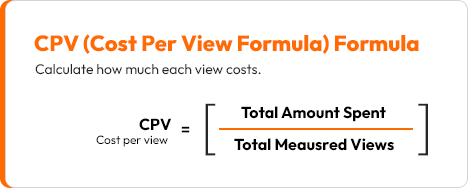CPV (Cost Per View) Calculator

The CPV Calculator is a simple, easy-to-use tool that can help you determine the most cost-effective way to run your video ads.
This information can help you adjust your budget or bidding strategy to get the most out of your advertising campaign.
How to Calculate CPV (Cost Per View)
CPV (Cost Per View Formula)
| CPV = | Total Amount Spent | X 100 |
| Total Measured Views |
Here,
- CPV: The Cost incurred against each View
- Total Amount Spent: The total amount spent on the ad campaign
- Total Measured Views: The number of times the ad was viewed and counted by the server

What Does CPV Mean
CPV is short for "Cost Per View," a metric used to measure the cost of advertising generally for video ads. It tells you how much you're paying for each view of your ad.
For example, if you spend $1,000 on your ads and receive 10,000 views, then
| CPV = | $1000 | = $0.10 |
| 10000 |
Why Do You Need to Know CPV
Knowing the CPV for a given campaign can help you make more informed decisions about the allocation of your resources. If you know that a particular ad is costing too much per view, you can either adjust your budget or try a different approach.
Conversely, if you find that your ads receive fewer views than expected, you may need to invest more money to achieve your desired results.
Why is The Cost Per View Important
When you run a video ad, you have two main choices:
- CPC (cost per click) or
- CPV (cost per view)
CPC ads charge you every time someone clicks on your ad, regardless of whether they watch the entire thing or not.
With CPV, you're charged only when someone watches your entire ad. This makes CPV a more cost-effective option for many advertisers, especially while targeting a specific audience rather than general traffic.
Why Choose CPV Ads
CPV ads are a good choice for video ads because they guarantee viewership. Advertisers only pay when someone watches their ad for at least 30 seconds or until the end, whichever comes first. It helps eliminate the chances of viewers seeing the ad but not clicking on it.
Also, With CPV and video ads reporting, you can evaluate how engaged viewers are with your content, where they choose to watch your videos, and when they drop off from watching your content.
How to Decide the Max CPV Bid Amount to Set
When you're setting your max CPV bid amount, you must consider the following :
- Reach: The estimated reach number that you get while setting your ad campaign
- Budget: The amount you wish to spend on a given day (You don't want to exceed this amount, even if it means you get fewer views.)
- Amount per View: The amount you wish to pay for each view.
The higher you set the max CPV, the more likely you get views, but you'll also pay more for them.
Tips for Increasing Your CPV
A few things to remember that will increase your CPV and get the most:
- High Quality and interesting videos: This is the key to getting people to watch your videos. Produce interesting and high-quality videos if you want to increase your CPV.
- Tags: Use relevant tags when you upload your videos. This will help people find your video and increase your CPV.
- Target ads: If you target the right audience you'll get more bang for your buck.
- Test and measure: Try different things and see what works best for you. The more data you have, the better decisions you'll be able to make.
How does CPV affect your Ad Rank
CPV affects your Ad Rank because:
- The maximum CPV bid decides the probability of your ad winning the auction and getting displayed.
- It also impacts the placement of your video ad in search results pages when YouTube search results display them.
Are CPV and CPC the same?
No, CPC is the cost per click, while CPV is the cost per view. CPC charges you every time someone clicks on your ad, regardless of whether they watch the ad or not. Whereas, CPV charges you when someone watches your ad for at least 30 seconds or when the viewer engages with it.
Why would I choose CPV over CPC?
CPV charges you only when someone watches your ad for at least 30 seconds or till the end.
It is a more cost-effective option for many advertisers, especially those targeting a specific audience rather than general traffic. So, it eliminates the chances of viewers seeing the ad but not clicking on it.
How is Google ad CPV calculated?
Google Ads CPV is calculated by dividing the total cost of your campaign by the number of views it received.
How is YouTube CPV calculated?
YouTube CPV is calculated by dividing the total cost of your campaign by the number of views it received.

